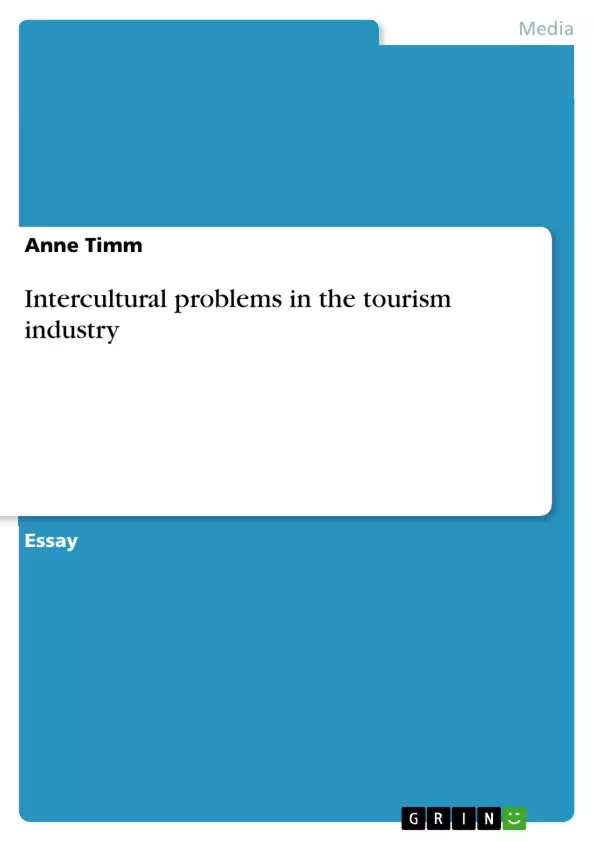“McDonaldization” (GeorgRitzer), “Cocacolization” (Zdravko Mlinar) and “Mc-World” (Benjamin Barber) are just a few key words of a topic that has gained worldwide interest today. The Globalization is on the roll and seems to be unstoppable. [1] One by one, the world has become a ‘global village’ with multicultural societies, where it is unavoidable for us to get in greater contact with the rest of the world and other cultures. Our daily lives develop an increasingly international orientation. Globalization produced a demand for intercultural communication and awareness for both the tourism industry and many different commercial sectors. The travel and tourism industry has experienced a growing internationalization during the past decades. Especially here people are exposed to cultural different societies. In the tourism industry it is substantial to know cultures in its various forms and dimensions since it has a significant impact on tourism planning and development, management and marketing. Companies in the tourism industry have to understand the influence of national cultures on their consumers to be able to compete for market share successfully. Intercultural communication helps tourists to keep the quality of the interaction with different nationalities high and therefore contribute to their holiday experiences and perceptions of the visited destination. Many intercultural problems within the tourism industry arose during the past years and are becoming more and more threatening for both the host destinations and the tourist himself. This paper describes, analyzes and also discusses some of those problems in the tourism industry and try to find a possible solution for them in order to eventually smoothing the way from a global village to a global community.
Inhaltsverzeichnis (Table of Contents)
- Introduction
- Defining words and phrases
- Culture
- Communication
- Inter- and cross-cultural
- Intercultural Adaption in Tourism
- Culture Confusion
- Discussion of its application today
- Conclusion
Zielsetzung und Themenschwerpunkte (Objectives and Key Themes)
This paper aims to analyze the increasing prevalence of intercultural problems in the tourism industry. The text examines how globalization, particularly the growth of the tourism industry, necessitates understanding cultural differences for successful communication and interaction. It explores the concept of intercultural adaptation, including challenges and potential solutions for a more harmonious global community.
- Globalization and Intercultural Communication
- Cultural Differences in Tourism
- Intercultural Adaptation
- Cultural Confusion
- Promoting Intercultural Understanding
Zusammenfassung der Kapitel (Chapter Summaries)
The introduction sets the stage by highlighting the growing importance of intercultural communication due to globalization and its impact on the tourism industry. Chapter 2 delves into defining key terms like culture, communication, and inter- and cross-cultural contact, providing a foundation for further discussion. Chapter 3 explores the complexities of intercultural adaptation in tourism, emphasizing the significance of understanding cultural differences for successful tourist experiences and the potential challenges of cultural confusion.
Schlüsselwörter (Keywords)
Key terms and concepts within the text include globalization, intercultural communication, tourism industry, cultural differences, intercultural adaptation, cultural confusion, and global community. These terms represent the core areas of focus for the paper, emphasizing the importance of understanding and navigating cultural complexities in a globalized context.
Frequently Asked Questions
How does globalization affect the tourism industry?
Globalization has turned the world into a "global village," increasing international travel and making intercultural communication essential for successful tourism management and marketing.
What is meant by "McDonaldization" in tourism?
The term refers to the worldwide homogenization of cultures and services, leading to a standardized global experience that can sometimes threaten local cultural identities.
What is "Culture Confusion" in a travel context?
Culture confusion arises when tourists or hosts misunderstand each other's cultural norms, leading to friction, dissatisfaction, or negative perceptions of a destination.
Why is intercultural adaptation important for tourists?
Adaptation helps tourists interact effectively with different nationalities, enhancing their holiday experience and promoting better relations between hosts and guests.
What is the difference between inter-cultural and cross-cultural?
The paper defines these key phrases to distinguish between the interaction of different cultures (inter-cultural) and the comparison of different cultures (cross-cultural).
- Citation du texte
- Anne Timm (Auteur), 2011, Intercultural problems in the tourism industry, Munich, GRIN Verlag, https://www.grin.com/document/178258



